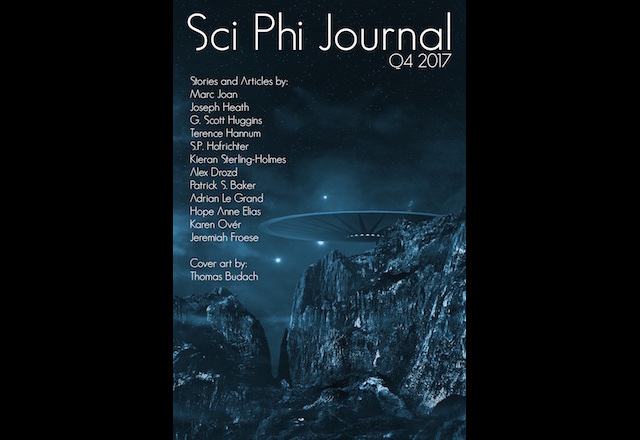
Mid-way through the year I purchased a struggling publication that was about to close down. Despite my efforts to turn it around, Sci Phi Journal will still cease at the year’s end. There may come a time when it is worth ruminating on the reasons for failure, but probably not. I suspect that Sci Phi Journal will simply disappear from the collective memory; the exception will be those authors who sold their first story to SPJ. I know what I learned from the experience, but the ability to recount a story is not predicated on there being an audience willing to listen to it. So rather than analysing the reasons for SPJ’s demise, I prefer to emphasize the positives drawn from the brief time I owned and edited the magazine. And mostly those positives involve people, who I have been extraordinarily fortunate to encounter as a consequence of running SPJ, and would not have met otherwise. The following list is not complete, and will not be deliberately circulated. I will not even advise the people named that I have mentioned them here. However, there is a possibility that somebody will someday google one or two of these names whilst researching the history of a successful author or publisher. If so, I hope to pleasantly surprise that researcher.
Sarah Paige Hofrichter, whose byline is SP Hofrichter, is an excellent communicator of ideas that fizz with intellectual energy. The mind boggles at her having a baby without that causing any interruption to the delivery of her column. Her appreciation of sophisticated philosophical issues and Norse mythology means she is literally the only person who should be allowed to script the inevitable Thor vs. Doctor Who motion picture.
David Kyle Johnson writes such thoughtful and impressive examinations of the works of mainstream science fiction that anybody who has read them will have learned nothing from this sentence. Everyone else should just read his articles, or enrol on the courses he teaches.
Marc Joan writes good stories based on real science. The stories have a timeless quality but the science is cutting edge. On that basis, he epitomizes the ideal virtues of a science fiction writer.
Mary-Jean Harris is both effervescent and spiritual at the same time. I consider her to be the personification of a metaphysical cocktail.
Words fail me when I contemplate Rananda Rich. This is a shame, because words never seem to fail her.
Matthew P. Schmidt wrote the best science fiction short story that I have ever read. I would feel blessed if I was not such an unworthy publisher.
G. Scott Huggins is tremendously productive. His fertile imagination proffers great stories, and he is steadfast in his beliefs. I admire his capacity to tear into intellectual positions he disagrees with without ever being unfair. He deserves a bigger following, though if he keeps working as hard as he did for SPJ, he should be guaranteed to amass it before too long.
Alex Drozd’s only fault was that he joined SPJ too late. If his column had begun earlier then he might well have attracted many new fans to SPJ, as well as to himself.
I had an intense desire to rewrite most of the sentences by Adrian Le Grand, but he would not let me. He was probably right. It was only months after reading his stories that I realized he is a great romantic writer who has adopted science fiction as a disguise.
Terence Hannum did let me rewrite some of his sentences, but a specific choice of word is to a great story what a brushstroke is to a great artistic vision. He would undoubtedly become very rich if he went to Hollywood and expounded his ideas during the time it takes to ride an elevator.
Joseph Heath has already reached a level of success where he can gain nothing by receiving a compliment from me. So whilst I did not fully agree with his analysis of the fiction of Iain M. Banks, I was amazed that he paid me the courtesy of reading my own take on the same author. The mind boggles at how he can find time for such niceties whilst being a serious and popular thinker.
James ‘Jim’ Fitzsimmons was asked to review an awful lot, but he still improved everything he read. He worked hard, was unfailingly polite, and generous to a fault. If I knew how to clone people then I would have cloned Jim and sacked myself. Two Jims might have been able to keep SPJ going, and three would have turned it into a success. However, there are very few people like Jim Fitzsimmons, so I was lucky to have worked with one.
As for the nameless people who resisted the temptations of fame (!?) and chose to work anonymously on SPJ, you know who you are, and how much I am indebted to you. Which is not to say I am literally indebted, because I paid your invoices on time, but instead means I will always owe you gratitude.
And those of you who read Sci Phi Journal deserve an honourable mention, though I am not going to send you certificates like the Writers of the Future contest. If only there had been more like you!

Be the first to comment